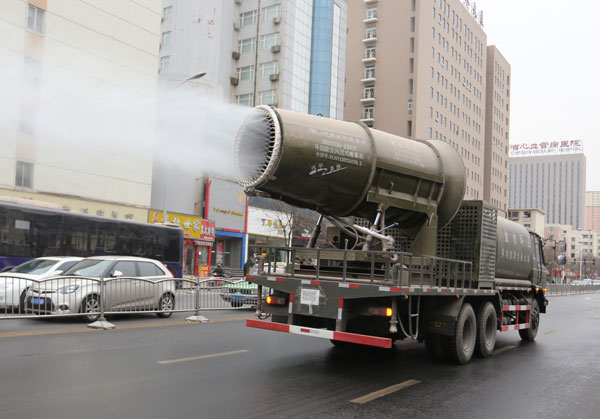Asthma on the rise over past decade
By SHAN JUAN (China Daily) Updated: 2015-01-07 04:46
 |
|
A specially designed truck sprays mist to reduce dust in the air in Zhengzhou, Henan province, on Tuesday. The vehicle is said to be able to alleviate smog effectively. Yang Zhenghua / For China Daily |
Asthma cases have risen dramatically in China over the past decade along with ever deteriorating air pollution, according to leading respiratory specialists.
Nationwide, the prevalence of asthma stands at 1 to 2 percent, while in some cities it can reach more than 10 percent, a leading pulmonary physician said.
Lin Jiangtao, director of the China Asthma Alliance and a physician at China-Japan Friendship Hospital, was citing results from the first nationwide epidemiology survey on asthma, which he led.
The potentially fatal disease has risen quickly across the nation, with Shanghai recording the fastest increase in prevalence of 190 percent over the past decade.
"Given that air pollution is a major risk factor in asthma, the disease is still rising constantly," Lin warned.
In a widely reported case, Chinese mother Shang Yujun moved her son to three different Chinese cites to escape air pollution before finally settling in London to control his asthma.
Lin suggested that patients with the disease limit outdoor activities and heavy exercise on days with high concentrations of pollutants, as such conditions can prompt asthma attacks.
Asthma is the leading cause of hospitalization among children in China and imposes a significant burden on their families. Patients with the condition have increased rates of work absenteeism.
The Asia Asthma Development Board said China has the world’s highest mortality rate from asthma, with 36.7 out of 100,000 patients failing to survive.
Wang Chen, a leading respiratory disease expert and an academic at the Chinese Academy of Engineering, said, "Various respiratory diseases have become a public health challenge in China."
But he said public awareness remains poor in a country where only 34 percent of the cases are under control.
Of the more than 30 million patients in China, about 80 percent fail to effectively control the disease and less than 5 percent have received standard treatment, Lin said.
A 36-year-old patient surnamed Wang, from Hebei province, said he used to be hospitalized three times a year in Beijing for serious asthma attacks. He was diagnosed with the disease after having it for more than a year.
"I frequently felt out of breath and had to take a rest when climbing up several steps," he said.
Drug therapy and a surgical procedure called bronchial thermoplasty helped put him back on his feet after he had to use a wheelchair.
Wang Chen called for standardized treatment and improved access to drug treatment for asthma patients.
- Govt encourages people to work 4.5 days a week
- Action to be taken as HIV cases among students rise
- Debate grows over reproductive rights
- Country's first bishop ordained in 3 years
- China builds Tibetan Buddhism academy in Chengdu
- Authorities require reporting of HIV infections at schools
- Typhoon Soudelor kills 14 in East China
- Police crack down on overseas gambling site
- Debate over death penalty for child traffickers goes on
- Beijing to tighten mail security for war anniversary







